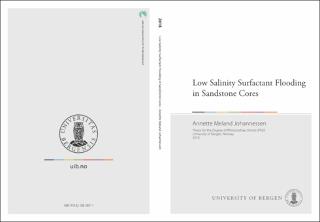Low Salinity Surfactant Flooding in Sandstone Cores
Doctoral thesis
Permanent lenke
https://hdl.handle.net/1956/18437Utgivelsesdato
2018-01-26Metadata
Vis full innførselSamlinger
- Department of Chemistry [433]
Sammendrag
A new generation enhanced oil recovery (EOR) methods comes from combining techniques to make the overall process more efficient than either of the processes alone. These combined methods are often called hybrid EOR methods, and in this work, we investigate the potential for further enhancement of oil recovery by combining low salinity (LS) and surfactant (S) injection. When injecting LS water that holds a significantly lower salinity than the formation water salinity, it is believed that destabilization of oil layers adhering to mineral surfaces making the surface more water-wet could be a contributing mechanism to EOR. Surfactant flooding is a proven EOR technique, which mobilizes capillary trapped oil by lowering the oil water Interfacial Tension (IFT). The majority of the literature on the topics of low salinity and surfactant flooding addresses one or the other. In this study, however, we investigated whether combining the two processes of low salinity injection with surfactant (LSS) injection would be more efficient than either of them applied alone. We propose that by taking advantage of the oil that has been destabilized by LS injection, only a moderate reduction in IFT by adding surfactant could contribute to production of the destabilized oil, which may not reach the producer if capillary forces are_high. We showed that by taking advantage of the oil destabilized by LS injection, and combining it with Winsor I surfactant flooding experiments to give a moderate reduction in IFT, the combined process gave comparable recoveries to traditional surfactant flooding experiments operating in the ultralow IFT regime. Further, comparing data from LSS experiments to high salinity surfactant (HSS) injection experiments at similar capillary numbers showed lower residual oil saturations for the LSS experiments. The different CDC for LSS experiments indicate that there is a combined effect of IFT reduction and LS injection on oil recovery compared to a traditional reduction in IFT alone.
Består av
Paper I: Spildo, K., Johannessen, A., M. and Skauge, A. (2012) Low Salinity Waterflood at Reduced Capillarity. SPE-154236. Presented at the Eighteenth SPE Improved Oil Recovery Symposium, April 14-18, Tulsa, Oklahoma. Full text not available in BORA due to publisher restrictions. The article is available at: https://doi.org/10.2118/154236-MSPaper II: Johannessen, A., M. and Spildo, K. (2013) Enhanced Oil Recovery (EOR) by Combining Surfactant with Low Salinity Injection. Published in Energy & Fuels, 27, 10: 5738-5749. Full text not available in BORA due to publisher restrictions. The published version is available at: https://doi.org/10.1021/ef400596b
Paper III: Johannessen, A., M. and Spildo, K. (2014) Can Lowering the Injection Brine Salinity Further Increase Oil Recovery by Surfactant Injection under Otherwise Similar Conditions? Published in Energy & Fuels, 28, 11: 6723-6734. Full text not available in BORA due to publisher restrictions. The published version is available at: https://doi.org/10.1021/ef500995y
